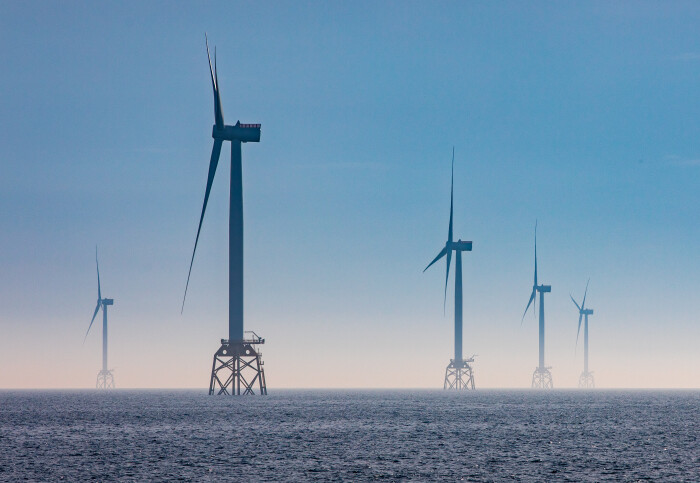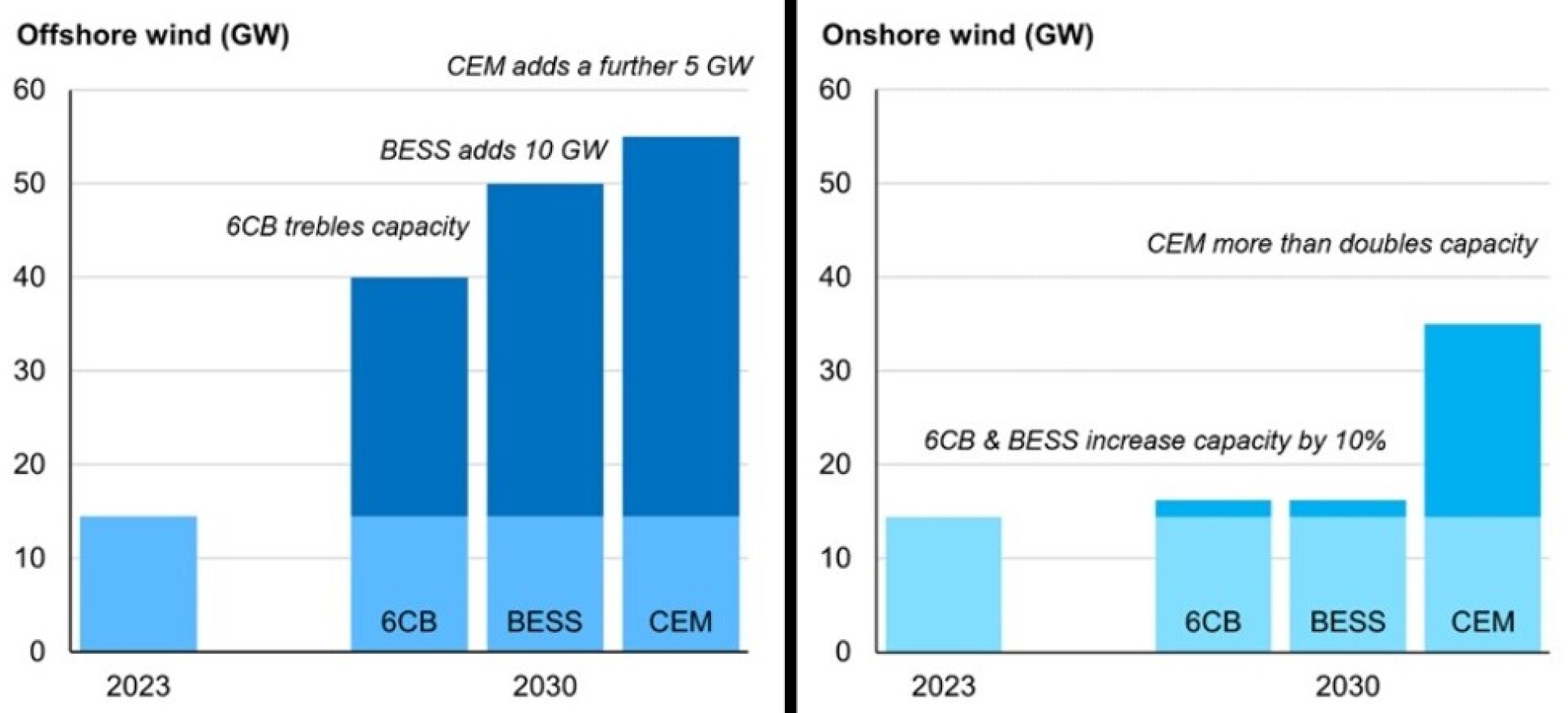UK poised to lead G7 on clean electricity production
by Ian Mundell

Ambitious clean energy policies mean the UK can make stronger carbon reduction commitments when international targets are revised in 2025.
The UK is in a position to become the leading low-carbon nation in the G7, thanks to ambitious clean electricity policies set in motion by successive governments. These policies will also allow the UK to raise its international commitment, or Nationally Determined Contribution (NDC), to cutting carbon emissions at next year’s COP30 climate conference in Brazil.
These projections are made in reports by Dr Iain Staffell and colleagues from Imperial’s Centre for Environmental Policy working independently via Imperial Consultants for the energy company SSE.

The researchers have analysed the impact of two recent clean energy policies on carbon emissions in the UK: the British Energy Security Strategy introduced by the Conservative government in 2022; and the Clean Power Mission promised this year by the new Labour government.
They have also devised a clean electricity scorecard for the G7 nations, ranking their progress in decarbonising electricity over the past decades and their pledges for the future. This is something no-one has done before, said Dr Nathan Johnson, the lead contributor to the studies. “We’ve taken data and targets that are difficult to interpret, and turned them into something that hopefully anyone can understand,” he says.
This work has also been published in the peer-reviewed journal Energy Strategy Reviews*.
From third to first place
The Clean Electricity Scorecard has three simple, yet critical, metrics: the share of clean electricity; gross carbon intensity; and net carbon intensity. These are scored with a traffic-light system to represent falling behind (red), almost on track (amber) and on track (green).
Between 2010 and 2022, the UK jumped from last in the G7 to third in terms of clean electricity share. Commitments for 2030 announced when the UK last updated its NDC would see it remain in third place – almost on track in all categories – since the other G7 nations are making similar progress.

Implementing the Conservative’s British Energy Security Strategy would have taken the UK to second place, above Canada, with a clean share of 93%. Labour’s new Clean Power Mission would take the UK to the top of the G7, above France, with a clean share of 97%. If these targets are achieved all of its metrics turn green.
This move is significant because of the rapid expansion of clean energy sources in the UK. “France and Canada have lots of nuclear and hydro power, but that’s a legacy, installed not because they were low carbon but because they were the cheapest way to meet demand for electricity at the time,” Dr Johnson explains. In contrast, the UK has rapidly decarbonised an electricity system built on fossil fuels.
Setting targets
The Imperial analysis also shows that implementing the two clean energy policies would give the UK scope to increase its NDC under the Paris Agreement on climate change, which is due to be updated at the COP30 climate conference in Brazil in 2025.
“This work involved some quite dense modelling,” explains Dr Johnson. “We took the targets for renewable energy deployment and ran them through a power systems model, which tells us what this means for emissions and the kind of electricity generation sources that would be displaced by new wind and solar installations.”
At the recent COP29 meeting in Baku, the Labour government announced that its NDC for 2035 would be an 81% reduction of carbon emissions compared to 1990 levels. This is three percentage points more than the previous commitment of 78%, set by the Conservatives in 2021, although it now excludes emissions from international aviation and shipping. Meanwhile, the government has not yet announced any change to the more pressing NDC for 2030.

 According to the Imperial analysis, implementing the British Energy Security Strategy would allow the UK to upgrade its 2030 commitment by 0.9 percentage points to a 68.9% reduction on 1990 levels. The more ambitious Clean Power Mission would allow the 2030 commitment to be increased by 2 percentage points to 70%. This represents an additional saving of 8-17 million tonnes carbon dioxide emissions each year.
According to the Imperial analysis, implementing the British Energy Security Strategy would allow the UK to upgrade its 2030 commitment by 0.9 percentage points to a 68.9% reduction on 1990 levels. The more ambitious Clean Power Mission would allow the 2030 commitment to be increased by 2 percentage points to 70%. This represents an additional saving of 8-17 million tonnes carbon dioxide emissions each year.
But Labour’s plans will have only a limited impact on the 2035 NDC, since a net-zero power system was already planned in the Conservative policies.
“Labour’s plans to accelerate the deployment of clean electricity will only enable an upgrade of 0.8 percentage points on the 2035 NDC, roughly a quarter of the 3 percentage points upgrade pledged at COP29,” Dr Johnson says. “So, the emissions reductions required to meet that pledge will have to come from other sectors, such as transport and buildings. The additional clean electricity delivered by Labour’s policies can help to back out fossil fuels by powering electric vehicles and heat pumps.”
Getting the message out
SSE chose Dr Staffell’s group to carry out this work because of its ability to bring clarity to the complex business of energy systems. Alongside his research into sustainable energy systems, for example, Dr Staffell leads the Drax Electric Insights project, an interactive website and quarterly report also commissioned via Imperial Consultants that follows the supply, demand, price and environmental impacts of Britain's electricity.
“We thought that Iain and his team would be well-placed to help us tell the story of the success that has happened in decarbonising the GB electricity system. Alistair McGirr Group Head of Policy and Advocacy, SSE
“We’d seen some of the work Iain and his team have been doing with data visualisation of quite complex trends in the British power system,” explains Alistair McGirr, Group Head of Policy and Advocacy at SSE.
“We thought that they would be well-placed to help us tell the story of the success that has happened in decarbonising the GB electricity system, and how upcoming ambition could be translated into real-world action and hopefully encourage others to follow suit internationally.”
According to Dr Johnson, efforts to decarbonise electricity need to accelerate across all G7 nations. “We show that the UK’s latest commitments could meaningfully move the dial on its NDC,” he says. “Hopefully that will be an inspiration to other nations to do the same ahead of the next COP.”
*Evaluating clean electricity transition progress across UK political pledges and G7 countries. Nathan Johnson, Alistair McGirr, Luke Hatton, Olusola Bamisile, Alanna Rose Rooney, and Iain Staffell. Energy Strategy Reviews Volume 55, September 2024. https://doi.org/10.1016/j.esr.2024.101510
Main image courtesy SSE
Article text (excluding photos or graphics) © Imperial College London.
Photos and graphics subject to third party copyright used with permission or © Imperial College London.
Reporter
Ian Mundell
Enterprise